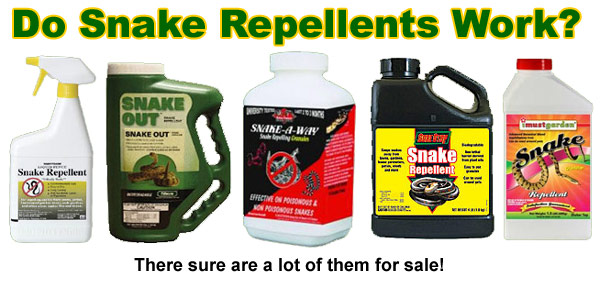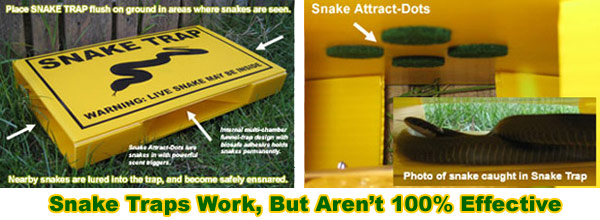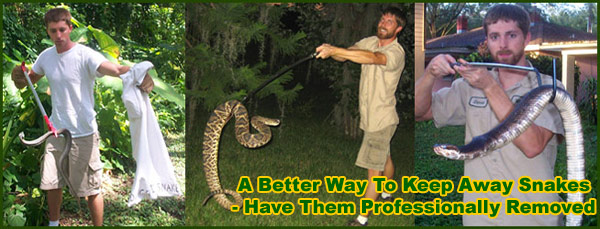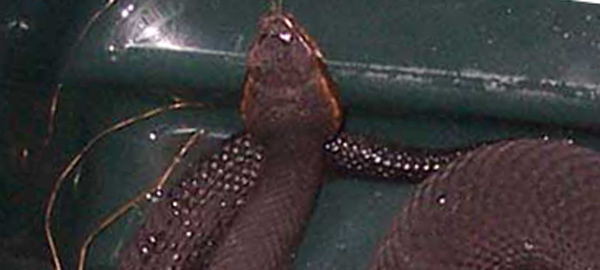- info@wildlife-removal.com
Call us for help in your town
Wildlife Removal Education
How Do You Keep Away Snakes
Option 1 - You can purchase and apply a snake repellent powder, sprinkle, spray, or noise device. But although these are sold, they are completely ineffective,
and a waste of time and money.
Option 2 - You can purchase a snake trap. These work, but they won't always catch the snake.
Option 3 - You can hire a professional in your area. Look on the internet for a company, or your local yellow pages, or you can find someone in your town from my directory that I list on this website.
This method is the most reliable, but the priciest.
Option 4 - You can make your property less attractive to snakes, by clearing out debris, keeping bushes and plants trimmed back, filling in any gaps under concrete or rocks (snakes LOVE these areas),
sealing any holes in your house or gaps under your doors, which snakes can enter the house via, or in extreme measures, you can install a fence around the perimeter of your property - a solid fence, not a
chain link fence of course.
Click here for my nationwide list of 100's of professional snake trappers serving all 50 states.

How to repel snakes from home -
First, do not use mothballs to repel snakes from a home. Mothballs are not the cure-all that the Internet would have you believed. Currently, mothballs are recommended for the removal of rats, mice, bats, snakes, groundhogs, armadillos, raccoons, opossums, and homeless people. It does not work for a single one of them. Instead of wasting time on figuring out a mixture of home chemicals to use as a repellent, go outside and take a good look at your property. Snakes want to live near places that have tall vegetation, lots of cover, and ample food. If your yard is un-mowed, covered in debris or junk, and rimmed by the outlines of dilapidated buildings, then you know what you have to do to get rid of snakes. You will be amazed at what just mowing your lawn will do for your snake issue. The grassy areas of a lawn usually make up the majority of the space. By keeping these locations trimmed, you eliminate the snake’s comfort level when it comes time to move around the yard. Even though snakes are carnivores, they are common prey animals for larger creatures. It would not take a raptor long to spot a snake slithering through short grass.

Snake traps -
There are both lethal and non-lethal traps on the market for snakes. Many of the lethal traps are body gripping devices. They will do the job as long as the snake enters them head-first. Sometimes the side-to-side motion of a snake can make it prone to getting caught lower down on the body. One of the most effective traps and one that is widely endorsed is a yellow glue trap with the words ‘snake trap’ written on the top. This trap will hold venomous or nonvenomous snakes firmly in place until they can be released. Just spray some cooking oil into the trap and the snake will work itself free. The best part is that the traps are reusable and just need to be rinsed with water. There is no reason to lethally trap snakes. People need to get past the creepy feelings they have toward the legless animals and realize that snakes are very helpful around a home. Sure, you don’t want an abundance of snakes, but having snakes n the yard means you won’t have a lot of rodents or insects.

Easy way to keep snake away from house -
There is a very easy way to keep a snake away from your house. All you need to do is keep up with your lawn care. It sounds silly, but failing to mow your yard or cut your trim is a huge sign to the snake world that they can get to your home unseen. Snakes, though predators, are fearful of predation from birds and other large animals. A snake will be very reluctant to slither across your yard if the grass is too short to cover it. The same can be said for your gardens. Plants that have been allowed to grow without guidance can mean thick, beautiful gardens, but they will also mean snakes. Think about all the insects and rodents that enjoy tall, thick vegetation around a home. If you have an abundance of these animals, you will have snakes coming to feed. Another good rule of thumb for keeping snakes away is to make sure you clean up any debris around your property. Aside from food, a snake will want something to hide under for shelter. You will not always be able to eliminate all the snake-friendly places around your home, but by keeping your grass short, you decrease the likelihood that a snake will want to try to approach those areas.
How does snake fence work -
Snake fence is a barrier that is constructed to keep snakes out from under buildings or inside gardens. It can be made of any material that is not easily moved or that contains large openings. Wire mesh is often a popular choice, though some people have installed solid, wooden fences as a precaution. The main thing to remember about snakes is that they do not need much space to make it under a line of fence. If you’re going to install a true snake fence, you should bury a few inches into the ground. This way, when the soil shifts from exposure to the weather, you will not be left with gaps that snakes can slither under. The type of material you use will also depend on the region you live in. Some snakes are fantastic climbers, and a wire fence may provide them with enough texture to make it over the barricade. A good rule of thumb, for any barrier fence, is to slope it outward at an angle that would prevent animals from making it over the top.
A snake fence is a good way to keep snakes out of a pool
How to seal basement from snakes -
Repairing the damaged areas around your home can be the most important thing you do to prevent pests. It doesn’t matter how many traps you set or how many nuisance animals you kill; if you have cracks or holes in your basement walls, snakes will be able to get inside. Sealing up your basement will depend on what kind of building material you are dealing with. Homes with concrete or stone foundations can use mortar to fill in cracks and openings. Mortar will dry hard; too hard for any snake or rodent to bother. If you’re working on the top part of the home where your siding is, you can use an expanding foam sealant to fix any open areas. Expanding foam will not stand up against rodents, but snakes are not inclined to chew back through just to get at a den sight. Remember that snakes in your basement are not there because they want to mooch off of your supplies. Most snakes end up in the basement on accident and then stick around because it is moist and cool. Frequent inspection of the exterior of your home will prevent all sorts of pests from entering and causing trouble.
Here are some other snake links:
How To Trap Snakes
How To Get Rid of Snakes
How to Kill Snakes
Snakes in the Attic
Snakes in the Basement
Photographs of Snake Poop
Best Ways To Keep Snakes Off of Your Property
Snakes are a species that are considered to be a nuisance by many people, but in reality they can actually be a great benefit to those who have a garden or a yard. Snakes are predators that will naturally prey on other pests such as insects for smaller animals, or rodents such as mice and rats for larger species of snake. However, there is a natural instinct about snakes to want to keep them away because they slither and because they aren't the most attractive or cute animals, but if you really want to there are measures that you can take to keep snakes away from your property.

Dealing With The Food Sources That Can Attract Snakes
The first step that you will need to take is to deal with the food source that will usually be drawing the snake to your property. This means removing any insect or rodent populations that are present in and around your property. Because snakes have a very good sense of smell, using organs in the mouth along with their nostrils, they are attracted to their prey from quite some distance away. Even if you can't catch these yourself, bringing in a professional to remove these pests will often keep the snakes away.
Adapting Your Yard Or Garden To Be Less Attractive To Snakes
There are several features within a garden or yard that can be attractive to snakes, and one of the first things to do is to remove the cover that snakes like to hide beneath, such as shady bushes, wood piles and other dark areas. Keeping the grass short can also help to keep the snakes away, while making sure any compost is kept in a sealed container to seal another area where snakes like to hide. Keep any bird seed and animal feed off the ground and away from where they can attract rodents, which will then attract the snakes.
Installing A Snake-Proof Fence Around The Property
If other measures are not successful, the next step is to install a more permanent barrier to keep the snakes away, and when putting in the fence, make sure it is embedded at least twelve inches under the surface. It is also important to ensure the fence fully surrounds the property, so that the snakes are permanently kept out of the property with the solid barrier.
Go back to the Snake Removal page.


















